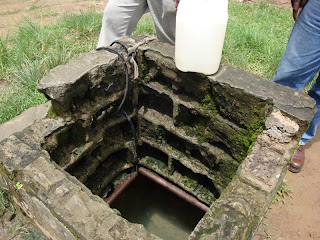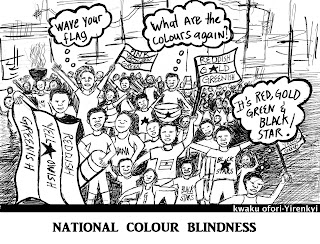A Drinking Well in Bardnersville, Liberia
Check out this comment from the Encyclopaedia of Earth of May 2008. “Liberia is in a post-war period facing serious political, financial, administrative and organizational problems. Ten years of conflict have led to multiple internal displacements of hundreds of thousands of people, disrupted the supply of basic social services, increased the vulnerability of women and children to extreme poverty, hunger, disease and HIV/AIDS. Poverty is widespread.
Access to education is limited. An estimated 80 percent of schools, health service structures, water wells and sanitation facilities have either been destroyed or abandoned since 1998. No up-to-date water supply and sanitation data are available, but those still functioning are in alarming and worrying conditions in almost all counties in Liberia.
As a result, morbidity and mortality rates remain high and may possibly deteriorate further as populations returning to these areas are expected to increase and thereby overstretch the already either only partly functioning or malfunctioning health and social infrastructures.”
It’s been two years since the above commentary was written about Liberia. Currently, Liberia is painstakingly picking up the pieces and is in a national reconstruction mode. Its people continue to return home. I’m lost in thought over this country I’ve had the chance to work in for the past few weeks.
This is a beautiful country with beautiful people. It’s the most fertile land I’ve ever set feet on. Wherever you turn, it’s plush green. Everything grows here, in gigantic sizes (more about this later). Liberia looks very much like God’s own country, a Garden of Eden of some sort. Yet, they waged a long and destructive war. Now, the country is bruised, with scars of war visible to the most casual observer (more about this later).
My thoughts about Liberia today centre on the impact of the return home of many who fled for dear life to various countries during the prolonged civil wars. Let’s just call them returnees, like we did in the case of Ghana in the 1980s.
Returning home after such a national trauma must necessarily be associated with hopes of restoration. A homecoming, the going back to the familiar must bring joy. But, can one ever truly go back home again? In cross-cultural adage, it is said that you can’t “step in the same river twice” because the river moves so never remains the same. What is perceived as home therefore changes; and the returnee also changes.
As I talk to Liberians of varied social status – from taxi drivers to government executives – in curiosity to glean into their war-time stories (I’ll bring you individual stories later), I hear a lot of sighs; lots of hmmmmm. So much is said by what is not said. Individual stories of the war period can only be punctuated with hmmmmm while they make genuine efforts to get their lives back together.
Yes, Liberia is rebuilding. But what does it mean to have a country with many returnees? What does the phenomenon of returnees do to the psyche of a country? How does it change the national character and culture?
Let me take you down a gloomy memory lane, to Ghana in the Year of Our Lord 1983 when an estimated one million Ghanaians hurriedly returned home when Nigeria drove them out. In 1985, another hundred thousand or so joined the returnee bandwagon. At the time, a nice word, repatriate, was used to describe the national shock of having an influx of its kith and kin suddenly return home, unplanned.
That was when the word returnee made it into Ghana’s national lexicon. These folks had earlier on left Ghana as economic refugees because they could not stand the heat in the kitchen – the poverty, hunger and destitution. So desperation to pursue greener pastures set in.
We called them “Agege returnees.” They arrived with bags, sacks, babies with runny noses, petty thieves, armed robbers, crap, scraps, miscreants and undiagnosed depressed folks; extra human beings, hungry, confused and desperate for dear life.
The “Ghana must go” people came by sea (some tossed out of some sort of giant fishing nets); they came by land (mostly on top of each other in trucks and vans); they came by air (the privileged who could afford). They came! Hungry, tired, angry, disappointed – they came. And Ghana had to accept them with their varied funky burdens. That was the single largest migration into Ghana in our recorded history.
The returnee influx had some positives as some brought money and goods in hot demand. These included ‘boom boxes’ which home-based Ghanaians instantly bought off their tired backs. But any positives in vibrant trading activities in the informal sector were short-lived because the returnees were met with bush fires and the associated famine in the midst of eye-popping ear-clogging nose-choking military dictatorship. In my estimation, the early 1980s were the worst years with regard to the quality of life of Ghanaians.
Most people went about hungry. We grew very lean on what was nicknamed the “Rawlings Chain.” I spotted mine, with bones sticking out like a person in a Nazi concentration camp. Stark poverty stared the majority of our people in the face. We used “Don’t Touch Me” soap. I learned how to make soap with powdered dried cocoa pods and palm kennel oil.
As a people, we begged and queued for anything. Wheat, oil, yellow corn, ‘kako’, milk powder, as well as unbaked bread and uncooked 'kenkey' were luxuries. Some of our people (our mothers!) were stretched out naked on tables, and whipped for either hoarding or selling one thing or the other above the ‘control price’.
I vividly recall other unimaginable horrors. The strange phenomenon of instant justice was introduced into Ghana with the influx of many and varied desperate returnees. The worst was the burning alive of anyone who was vaguely suspected to be a thief. The main tool used in the technique of human burning was old vehicle tires, placed around the neck of the suspected criminal. I witnessed one such abhorrent objectionable repugnant incident at the Kwame Nkrumah Circle. The memory will never leave me.
Without a doubt, the arrival of “Agege returnees” had a deep impact on Ghana’s national character. Ghana experienced a culture shock. So therefore with the many ‘returnees’ arriving home in Liberia after years of sojourn in different parts of the world, I can’t help but wonder what degree of changes this phenomenon would effect on the national character of Liberia. Would the negatives out-weigh the positives? Time will tell.
If Agege returnees, bush fires, famine and autocratic rule brought such untold hardships on Ghana, then the effects of a long drawn-out war in Liberia might be unimaginable.
War does not repair; it destroys. The interruption of war leads to retrogression. War doesn’t just stop progress; it pushes back whatever progress has been made. It sets the clock back. War is waged in the backyards of women and children. Rape is used in war as a weapon to crush womanhood, the backbone of families and nations. War destroys the psyche, the very depth of it. War does not just kill in the present; it kills in the future. War uproots sanity and impudently replaces it with insanity.
Chew on this and speak peace to Ghana.

